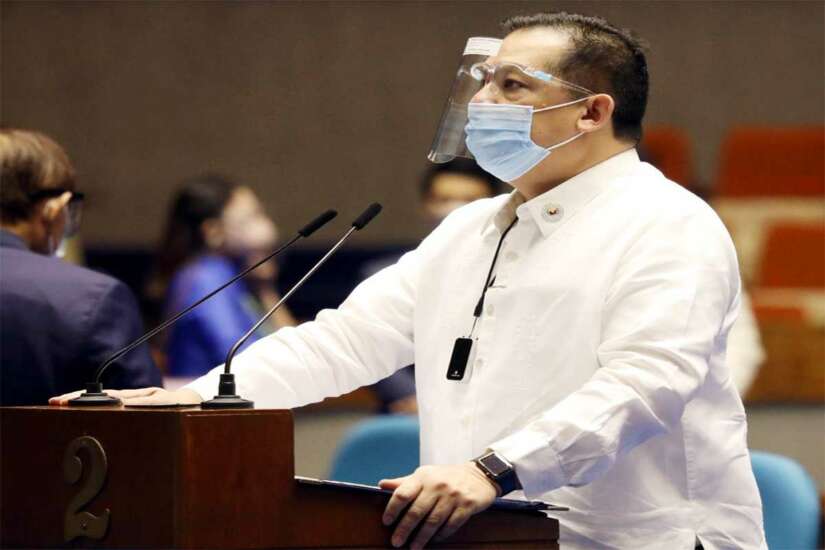VOTING against with abstention, the House of Representatives on Tuesday afternoon approved on third and final reading a bill extending the availment period of the estate tax amnesty from two years to four years as a way of economic relief for Filipinos in this time of coronavirus disease-19 (COVID).

House Bill (HB) 7068 seeks to amend Republic Act (RA) No. 11213 or the Tax Amnesty Act of 2019 to provide aid for Filipinos during the pandemic that led to unemployment, bankruptcies, and stalled economic activities.
“We thank our colleagues for supporting the passage of this very important measure. While the COVID-19 pandemic still persists, people will have extreme difficulty in paying their taxes much more in settling their estate tax dues even with this tax amnesty program,” said House Majority Leader and Leyte Rep. Martin Romualdez, Tingog party-list Rep. Yedda Marie K. Romualdez, and Deputy Majority Leader and Zamboanga Sibugay Rep. Wilter “Sharky” Palma II, principal authors of the measure.
According to them, amending RA 11213 will enable those who want to take advantage of this program ample time to recoup their resources and get back on their feet so they can still apply and pay their estate tax dues.
They said this is the reason why everyone who has outstanding estate tax liabilities as of December 31, 2017 “is encouraged to take advantage of this excellent and rare opportunity offered by the government.”
“It’s just unfortunate that the Philippines is not spared from the ill effects of the COVID-19 pandemic, wherein many people lost their jobs and folded up their businesses. Most economic activities were stalled.
The people lost precious period of time and possible sources of income in order to avail of this tax amnesty program of the government,” they noted.
Albay Rep. Joey Sarte Salceda, chairman of the House committee on ways and means who sponsored HB 7068 under Committee Report No. 455, said the proposal will allow the transfer of long unsettled estates so these can be productive.
“The original deadline of availment and payment on April 23, 2020 has since been extended four times, with the new deadline set until December 31, 2020. However, only 23,911 persons have availed of the amnesty, earning only P1.362 billion out of the potential P6 billion-plus. Thus, it is apt that we extend it through legislation,” Salceda said.
AAMBIS-OWA Party-List Rep. Sharon Garin, chairperson of the House committee on economic affairs, sponsored the measure that would give delinquent taxpayers more time to settle their liabilities by extending the period of the estate tax amnesty’s availment.
Other authors of the bill are Deputy Speakers Michael “Mikee” Romero (1-Pacman party-list), Johnny Pimentel (Agusan del Sur), and Aurelio “Dong” Gonzales (Pampanga), Reps. Sonny Lagon (Ako Bisaya party-list), Adriano Ebcas (Ako Padayon Pilipino party-list), Mark Go (Baguio City), Alfel Bascug (Agusan del Sur), Jose “Ping-Ping” Tejada (North Cotabato), Cheryl Deloso-Montalla (Zambales), Sergio Dagooc (APEC party-list), Estrellita Suansing (Nueva Ecija), Faustino Michael Carlos Dy III (Isabela), Kristine Singson-Meehan (Ilocos Sur), Joy Myra Tambunting (Parañaque City), Jose “Jun” Ong Jr. (Northern Samar), Deogracias Victor “DV” Savellano (Ilocos Sur), Micaela Violago (Nueva Ecija), Joseph Stephen “Caraps” Paduano (Abang Lingkod party-list), Horacio Suansing Jr. (Sultan Kudarat), Jesus “Bong” Suntay (Quezon City), Ramon Nolasco Jr. (Cagayan), Jumel Anthony Espino I (Pangasinan), Ron Salo (Kabayan party-list), Evelina Escudero (Sorsogon), Lawrence “Law” Fortun (Agusan del Norte), Rudys Caesar Fariñas I (Probinsyano Ako party-list), Jake Vincent Villa (Siquijor), Janice Salimbangon (Cebu), Arnie Fuentebella (Camarines Sur), Lorenz Defensor (Iloilo), Jose Enrique Garcia (Bataan), Teodorico Haresco (Aklan), Sabiniano Canama (COOP-NATCCO party-list), Eddiebong Plaza (Agusan del Sur), Jose Gay Padiernos (GP party-list), Cesar “Jawo” Jimenez Jr. (Zamboanga City), Ma. Theresa Collantes (Batangas), Weslie Gatchalian (Valenzuela City), Pablo John Garcia (Cebu City), Rose Marie “Baby” Arenas (Pangasinan), Joselito “Joel” Sacdalan (North Cotabato), Joaquin Chipeco Jr. (Calamba Ciy), Jericho Jonas “Koko” Nograles (Puwersa ng Bayaning Atleta party-list), and Henry Villarica (Bulacan).
 RA 11213 was signed into law by President Rodrigo “Rody” Duterte last February 14, 2019.
RA 11213 was signed into law by President Rodrigo “Rody” Duterte last February 14, 2019.
Under the law, the government provides the taxpayers a one-time opportunity to settle estate tax obligations through an estate tax amnesty program that gives reasonable tax relief to estates with outstanding estate tax liabilities.
The law provides that taxpayers who avail of the estate tax amnesty enjoy immunity from the payment of estate taxes, civil, criminal, and administrative cases and penalties.
Failure to avail of the estate tax amnesty means that previously suspended late estate tax penalties will be applicable, and the costs to transfer estates will be very costly.
The estate tax amnesty covers the estate of decedents who died on or before December 31, 2017, with or without assessments duly issued therefor, whose estate taxes have remained unpaid or have accrued as of December 31, 2017.
Under the law, the executor or administrator of the estate, or if there is executor or administrator appointed, the legal heirs, transferees or beneficiaries, who wish to avail of the estate tax amnesty shall do so within two years from the effectivity of the implementing rules and regulations (IRR) of RA 11213.
The bill amends Section 6 of the Tax Amnesty Act of 2019 to read, “The executor or administrator of the estate, or if there is no executor or administrator appointed, the legal heirs, transferees or beneficiaries, who wish to avail of the Estate Tax Amnesty shall within four (4) years from the effectivity of the Implementing Rules and Regulations (IRR) of this Act, file with the Revenue District Office of the Bureau of Internal Revenue, which has jurisdiction over the last residence of the decedent, a sworn Estate Tax Amnesty Return, in such forms as may be prescribed in the IRR.”
According to the existing language in RA No. 11213, it only prescribes an availment period of two years.

